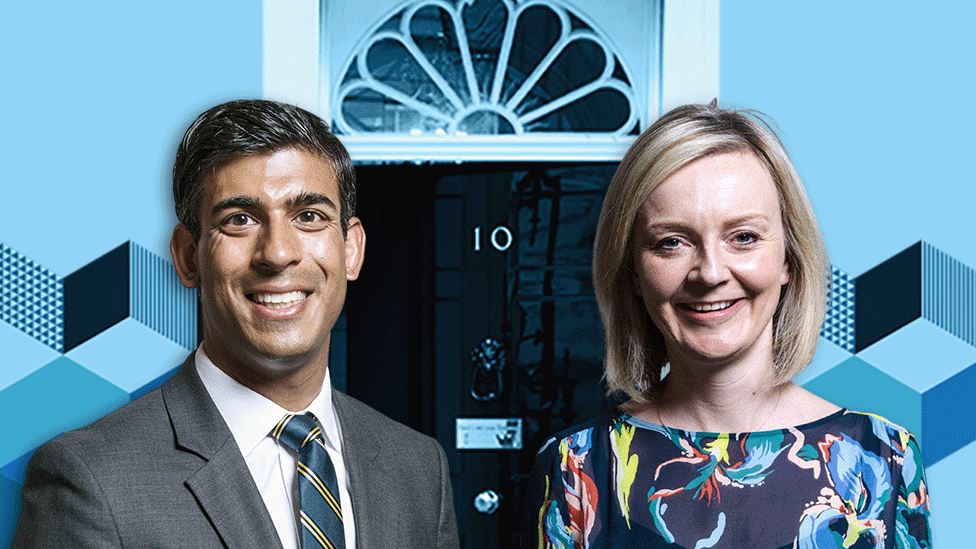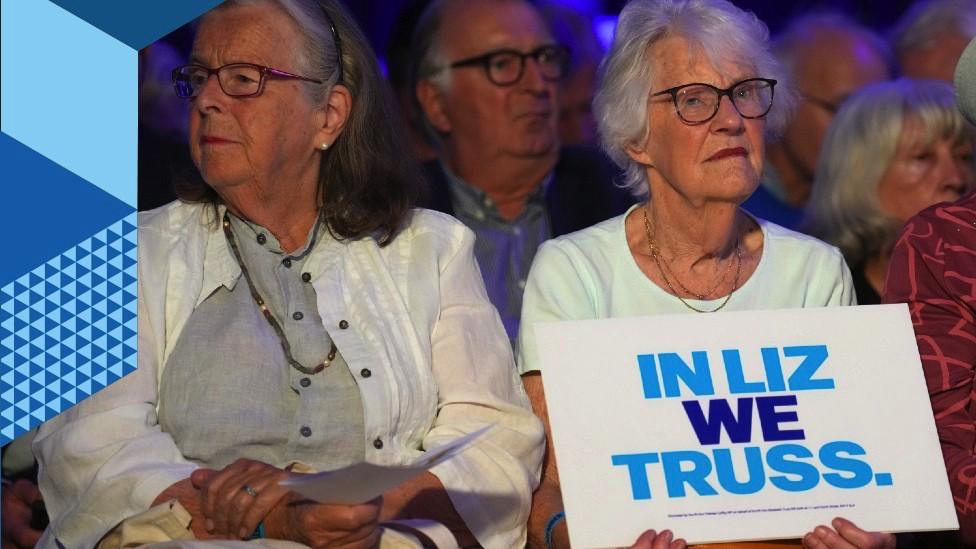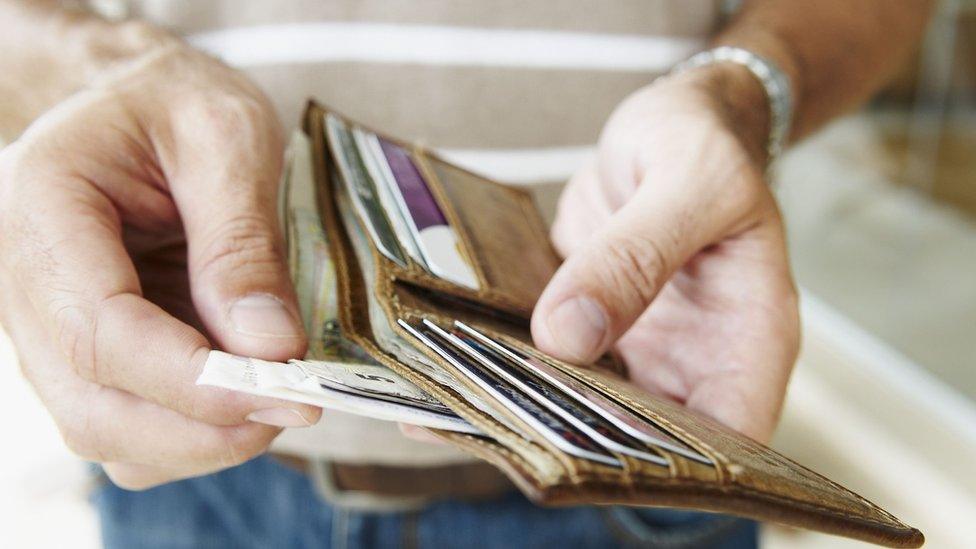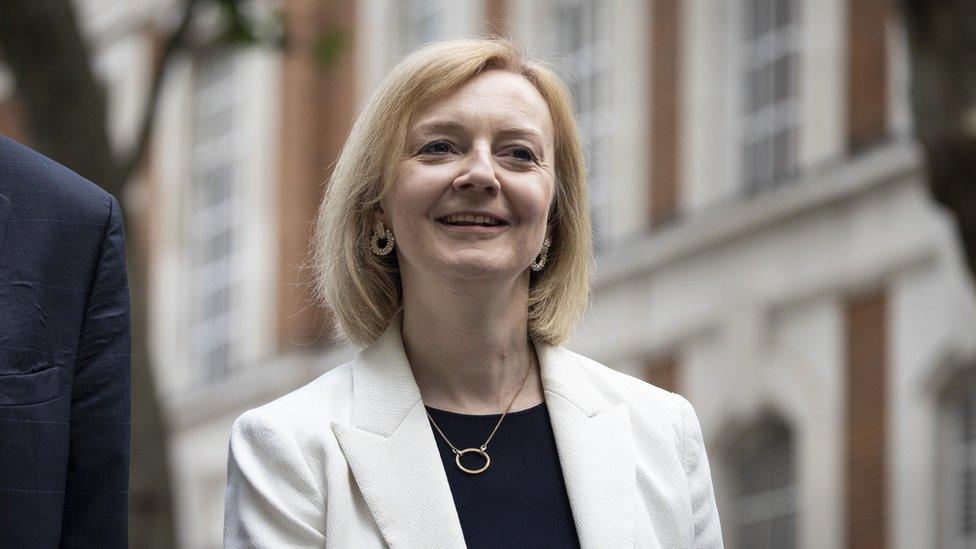Three policy questions Liz Truss and Rishi Sunak must answer
- Published

The final two in the race to become prime minister are facing big challenges when it comes to the economy.
Rishi Sunak and Liz Truss need to set out how they plan to conquer inflation, avoid recession and help the public through a record fall in disposable income.
I'm highlighting here three questions every member of the public will want an answer to as they hit the campaign trail.
Their response will be considered by a far smaller group of people: Conservative Party members and the way they vote will also define which way the party is set to turn.
Is it still a party about a small state, low taxes and the free market? Or has the big spending of the Covid era, coupled with promises of extra money for the NHS and talk of "taking back control", changed what it stands for? And what will that mean for the fundamental issues everybody is facing?

Billions of pounds of support is already being given out to households, especially low income ones. But, since that help was announced, it's become clear bills will rise even further than originally expected, perhaps to over £3,300 a year for an average household.
Some backbench MPs say households simply can't afford to pay bills at those levels, and are calling for more direct intervention to stop bills rising. Some are even suggesting breaking the link between bills and wholesale electricity and gas prices altogether. This would mean the government or suppliers paying for sudden cost rises and recouping the cost from customers over a longer period.
Ultimately, the pandemic may have raised expectations about what role government should take in a crisis. But so far neither candidate has indicated they plan to do anything very radical.
Rishi Sunak has not indicated any further help on bills beyond the existing support schemes he announced when chancellor. However, Liz Truss has said that she would reduce the "green levies" - these are the extra charges added to bills to help finance the switch to renewables. That could save bill-payers £153 a year. But the levies also help fund schemes to support poorer customers paying their energy bills, money that still needs to come from somewhere.
And the crisis over energy could get even worse of course, if President Putin cuts off gas supplies to Europe. In that situation, could either of the candidates contemplate telling the public to ration energy use?

For a few months last year, Prime Minister Boris Johnson's key message was that Britain deserved a pay rise. "Wage growth" would be the key measure of the success of his "levelling up" mission, he said. But very soon after, Mr Sunak's former department, the Treasury, clarified that wage rises would have to be justified by an increase in productivity.
Both candidates for prime minister seem concerned that if wage settlements go above 5% that could prompt a spiral of rising wages and prices, locking in high inflation for years.
And a recent round of public sector pay settlements pitched pay rises for nurses and the police at an average of around 4-5%, although lower paid staff are set for higher rises. While it is true that this is the largest cash rise in wages in two decades, as the government says, it is also true - as the unions point out - that it is one of the largest ever real cuts in wages ever seen.
With inflation heading above 10%, any annual wage settlements below that represent a real-terms cut, a shrinkage of the value of what people are taking home at the end of the month. So public sector workers could see their take home pay shrink sharply in value under either of the candidates.
Private sector pay settlements could of course be higher. And all pay packets would benefit from a policy advocated by the Truss campaign: to reverse April's National Insurance rise of 1.25%.
Mr Sunak has played down the prospect of personal tax cuts before autumn 2023 if he becomes prime minister, warning that early reductions would risk exacerbating the rise in the cost of living.

State pensions are due to go up by 10% in April as a result of the restoration of the "triple lock" policy, which guarantees the recent surge in inflation is reflected in pensioners' incomes. This will kick in, even if inflation has fallen back by then.
Mr Sunak has spoken in favour of the rise, arguing that, unlike higher wages for public sector workers, it won't add to inflation.
The government's official forecasters have pointed to the long term cost of this policy, as well as increasing spending on health and social care, but the candidates may well both stick to this policy of generosity towards the generation that's now in retirement.
On the other hand they could cut back on the considerable tax breaks high earners currently enjoy when saving for their old age. That would raise billions for the exchequer.
Or they could decide to raise the age at which the state pension is paid out. The Institute for Fiscal Studies calculated that previous rise to 66 years effectively doubled pensioner poverty among 65 year olds.
In this contest, what matters is how the candidates go down with around 160,000 Conservative Party members. But many of the promises made will set the course on the economy at a tricky time, affecting tens of millions more.

Related topics
- Published5 September 2022

- Published21 July 2022

- Published22 July 2022
